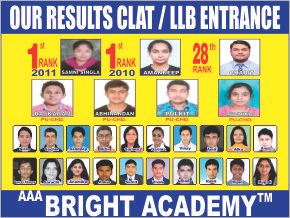CLAT COACHING IN CHANDIGARHBEST INSTITUTE FOR CLAT COACHING
|
(COMPLETE COURSE DETAIL)
|
1. Best coaching starting from basics,Coaching till exam
|
2. Highest success rate in CLAT,DU& PU ENTRANCE,Top Ranks In India
|
3. Full study material, Computerized Notes,No Need of Any Book from Market
|
4. Daily 3-4 hr class, classes 6 days week
|
· 5. Regular Tests
|
· 6. Shortcut methods in Maths/Reasoning.
|
· 7. New Batches are starting from 14,17,21,28 MARCH
4,7,11-APRIL ,
·
|
CLAT 2016 Important Dates – The exam conducting body, RGNUL Patiala has declared the dates of CLAT 2016 along with the scheduled events. CLAT 2016 Dates are provided below–
CLAT 2016 Events
|
Important Dates
|
Notification
|
December 14, 2015
|
Application Form
|
January 1 – March 31, 2016
|
Admit Card
|
April 15, 2016
|
Online Exam
|
May 8, 2016
|
Result and Rank List
|
May 23, 2016
|
Counselling and Seat Allotment
|
June 1 - July 6, 2016
|
CLAT means Common Law Admissions Test. It is an all India entrance examination conducted for admissions under-graduate and post graduate degree programmes (LL.B & LL.M)
Quick Facts on CLAT
CLAT 2016 will be conducted by Rajiv Gandhi National University of Law (RGNUL) Patiala on May 8, 2016
SET LAW
SET Law is a common
written test conducted for taking admission to undergraduate law programs
offered by law institutes under Symbiosis International University.
Eligibility: 45% marks for General Category student,40% marks for students of SC and ST category in Secondary Exam (10+2).
Age: Should be less than 20 years at the time of writing SET Law.
Exam Pattern:
Section Number of Questions Total
Marks
Logical Reasoning 30 30
Legal Reasoning 30 30
Analytical Reasoning 30 30
Reading Comprehension 30 30
General Knowledge 30 30
Total 150 150
Pattern of CLAT 2016 (Under-Graduate Programme)
| Exam Description | |
|---|---|
| Total Marks | 200 |
| Number of multiple-choice questions of one mark each | 200 |
| Duration of Examination | Two hours (02:00 hours) |
| Subject areas with Weightage | |
|---|---|
| English including Comprehension | 40 Marks |
| General Knowledge and Current Affairs | 50 Marks |
| Elementary Mathematics (Numerical Ability) | 20 Marks |
| Legal Aptitude | 50 Marks |
| Logical Reasoning | 40 Marks |
Note: There shall be a system of Negative Marking wherein 0.25 marks will be deducted for each of the wrong answer.
| |
The different subject areas of the examination:
1. English including comprehension
The English section will test the candidates’ proficiency in English based on comprehension passages and grammar. In the comprehension section, candidates will be questioned on their understanding of the passage and its central theme, meanings of words used therein etc. The grammar section requires correction of incorrect grammatical sentences, filling of blanks in sentences with appropriate words, etc.
2. General Knowledge and Currents Affairs
The candidates will be tested on their general awareness including static general knowledge. Questions on current affairs will test candidates on their knowledge of current affairs (broadly defined as matters featuring in the mainstream media between March 2014 to April 2015)
3. Mathematics
This section will test candidate’s knowledge on elementary mathematics, i.e. maths taught up to Class X.
4. Legal Aptitude
This section will test candidate’s interest towards study of law, research aptitude and problem solving abilities. Questions will be framed with the help of legal propositions (described in the paper), and a set of facts to which the said proposition has to be applied. Some propositions may not be “true” in the real sense (e.g. the legal proposition may be that any person who speaks in a movie hall and disturbs others that are watching the movie will be banned from entering any movie theater across India for one year). Candidates will have to assume the “truth” of these propositions and answer the questions accordingly.
5. Logical Reasoning
The purpose of the logical reasoning section is to test the candidate’s ability to identify patterns, logical links and rectify illogical arguments. It will include a wide variety of logical reasoning questions such as syllogisms, logical sequences, analogies, etc. However, visual reasoning will not be tested.
About The Common Law Admission Test (CLAT)
The Common Law Admission Test (CLAT) is an all India
entrance examination conducted on rotation by 17 National Law Universities
(NLUs) for admissions to their under-graduate and post-graduate degree
programmes (LL.B & LL.M.). The 17 participating NLUs in the order of their
establishment are:
1. National
Law School of India University, Bangalore (NLSIU)
2. National
Academy of Legal Study & Research (NALSAR) University of Law, Hyderabad
3. National
Law Institute University, Bhopal (NLIU)
4. The West
Bengal National University of Juridical Sciences, Kolkata (WBNUJS)
5. National
Law University, Jodhpur (NLUJ)
6. Hidayatullah
National Law University, Raipur (HNLU)
7. Gujarat
National Law University, Gandhinagar (GNLU)
8. Dr. Ram
Manohar Lohiya National Law University, Lucknow (RMLNLU)
9. Rajiv
Gandhi National University of Law, Patiala (RGNUL)
10. Chanakya
National Law University, Patna (CNLU)
11. National
University of Advanced Legal Studies, Kochi (NUALS)
12. National
Law University Odisha, Cuttack (NLUO)
13. National
University of Study & Research in Law, Ranchi (NUSRL)
14. National
Law University & Judicial Academy, Assam, Guwahati (NLUJAA)
15. DSNLU - Visakhapatnam
16. TNNLS – Tiruchirappalli
17. MNLU – Mumbai
15. DSNLU - Visakhapatnam
16. TNNLS – Tiruchirappalli
17. MNLU – Mumbai

